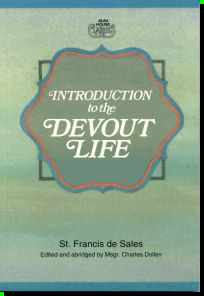
|
Posted March 23, 2005
Book: Introduction to the Devout Life Edited and abridged by Msgr. Charles Dollen Alba House, NY, pp.185 An Excerpt from the Preface:
In the same way, the Holy Spirit disposes and orders in many different ways the devout instructions he gives us in the words and example of his servants. Although the doctrine is always the same, statements of it differ greatly according to the authors and the applications. In this book, I will not write anything that has not already been offered by the writers of the past. Indeed, I couldn’t. The flowers I offer are the same; the bouquet I have made out of them differs from others because of the way I propose them. In the past, books on the devout life have been intended for those who had withdrawn from the world, or were preparing to do so. I intend to instruct those who live in cities, within families, or at the court and who, by their state in life are obliged to live an ordinary life as the world judges. . . . Erasmus encourages us when he say, “To study is a good way to learn; to hear it is still a better way; to teach it is the best of all.” St. Augustine, in a letter to Florentina adds, “It often happens that the office of giving gives us the merit to receive.” It is my belief that it is God’s will that I should paint on men’s hearts not only the ordinary virtues but also God’s dearest and most beloved devotion. I gladly do this in the hope, also, that by engraving devotion on the minds of others, my own mind will be filled with a holy love for it. If God sees me passionately in love with devotion, he will give it to me abundantly. An Excerpt from the Book: What is True Devotion? You desire to live a life of spiritual devotion because, as a Christian, you know that it is a virtue extremely pleasing to the Divine Majesty. Since small faults at the inception of a project grow infinitely larger as it proceeds until they are almost irreparable, first of all you must know what the nature of the virtue of devotion is. There is only one true devotion. All the rest are false and can lead you astray into something harmful or even superstitious. A painter may well superimpose the beauty of his beloved on all the women he paints. A man given to fasting may abhor rich foods and drink, but not hesitate to take his neighbor’s blood by calumny and detraction. Another considers himself devout because of the number of prayers he says each day, but he may use words at other times that are arrogant, disagreeable or deceitful. Still another gives his money from his wallet to charity but cannot find humility or kindness in his heart. Many persons clothe themselves with certain outward actions connected with holy devotion and the world believes that they are truly devout and spiritual, while, in fact, they are nothing but copies and phantoms of devotion. True devotion presupposes a thorough love of God and therefore it is simply true love of God. Inasmuch as divine love adorns the soul, it is called grace, which makes us pleasing to his Divine Majesty. In so far as it strengthens us to do good, it is called charity. When we arrive at that degree of perfection at which it not only makes us do good but also do this diligently, frequently and readily, it is call devotion. Ostriches do not fly; chickens fly in a faltering fashion; but eagles, doves and robins fly aloft, swiftly and frequently. Sinners do not fly up to God but lie mired in the earth filled with earthly objects. Good people who have not as yet achieved devotion fly towards God by there good works but do so seldom or slowly. Devout souls ascend to him promptly, more frequently and go on to lofty heights. In fact, devotion is simply that spiritual agility and vivacity by which charity works in us or through which we work quickly, cheerfully and lovingly. Since it is the province of charity to help us keep all of God’s commandments in general and without exception, so it is the function of devotion to enable us to observe them more promptly and diligently. Therefore, a person who does not observe all of the commandments cannot be thought of as good or devout. To be good, one must have charity; and to be devout, besides charity, he must have great cheerfulness and willingness in performing the works of charity. Table of Contents: Part 1 From the First Desire for the Devout Life Until the Resolution to Embrace it Part 2 Various Instructions on Prayer and the Sacraments Part 3 On the Practice of Certain Virtues Part 4. Advice about the most Frequent Temptations Part 5 Exercises for Renewing and Confirming the Soul |
|
